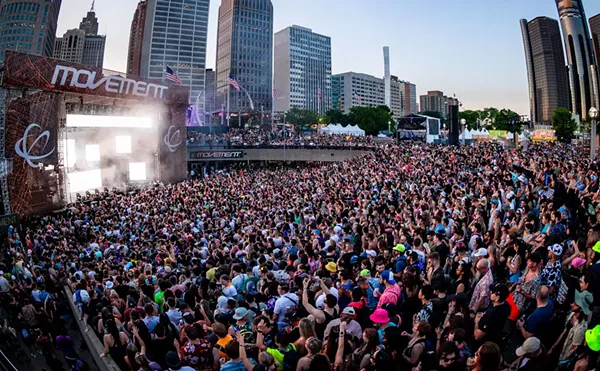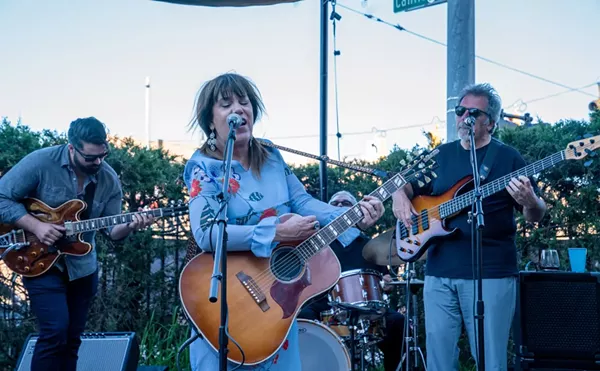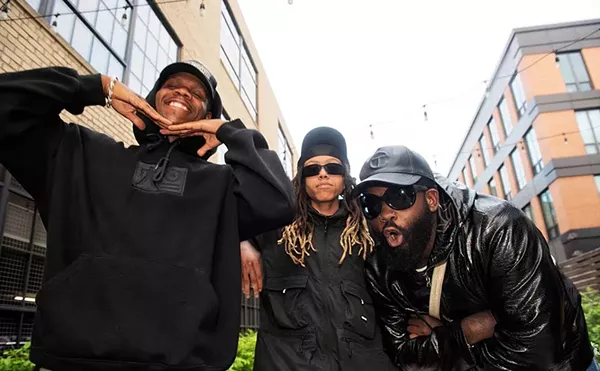
Audio By Carbonatix
[
{
"name": "GPT - Leaderboard - Inline - Content",
"component": "35519556",
"insertPoint": "5th",
"startingPoint": "3",
"requiredCountToDisplay": "3",
"maxInsertions": 100,
"adList": [
{
"adPreset": "LeaderboardInline"
}
]
}
]
When the dust settles and the last rounds have been quaffed, a lot of said dust will probably have been generated by the genre-busting activity of the diverse bill: from the quirked-out, acoustic, progressive whatsis of Only a Mother to the aggressive avant-rock of Larval, and the playful experimental jazz of Boston's Charlie Kohlhase. Then, incorporating all of the above with sublimely Coltranesque excursions into mind space, and sporting the uniqueness of a glowing international jazz reputation, will be the Bay Area's Rova Saxophone Quartet (celebrating its 20th year of existence).
This gathering promises to fuse disparate elements and shred preconceived notions. To the open-minded fan of jazz and other creative music, Edgefest will be the densest, most rewarding 13 hours of 1997.
Ann Arbor resident Dave Lynch, who organized Edgefest '97 in conjunction with the Kerrytown Concert House "Jazz at the Edge" Series, drew inspiration from out-of-town music festivals and from Detroit's own Earwhacks Festival of several years ago. Lynch not only liked the adventurous music these other events presented, he liked how they were presented: in several intimate environments as opposed to the outdoor soundstages of more conventional fests.
He's brought a bit of that intimacy to Edgefest. "We have the luxury here in Ann Arbor of having the Kerrytown area, which has several venues that are about a block apart that have kind of joined together in this venture," he says.
Besides bringing together national and internationally recognized acts, Lynch has given some relatively young local groups a share of the avant spotlight. "The thing that characterizes these Ann Arbor bands is that they are all excellent musicians, and they seem to have an artistic integrity and vision that isn't like your run-of-the-mill bar band," says Lynch.
With its Fender Rhodes and violin excursions, Poignant Plecostomus echoes the fusionoid inspiration of Mahavishnu, while Transmission explores retro-futurist jazz depths in a style that recalls the space and groove of early '70s Miles Davis. Both of these youthful bands should leave a lot of witnesses impressed, especially people who enjoyed this kind of music the first time around.
No less a jazz authority than comic writer and cultural critic Harvey Pekar has called Dave Douglas "arguably the best jazz trumpeter to emerge in the past two decades." Douglas' Tiny Bell Trio, with guitarist Brad Shepik and drummer Jim Black, will surely provide one of many festival highlights. "He is really an amazing trumpeter and composer. You read the critics' comments about him and you might think that it's just hyperbole, but I can't think of a musician who is more accomplished in so many different contexts and groups," says Lynch.
For instance, when he made his Michigan debut, Douglas performed with a string group. Back in New York City, he can be found in Masada, John Zorn's avant-jazz exploration of Jewish music. Meanwhile, the Tiny Bell Trio explores Eastern European folk motifs through the lens of avant-garde jazz.
 (Photo: Only a Mother)
(Photo: Only a Mother)
Besides providing stage space to standard-bearers and youngsters alike, Edgefest '97 will allow musicians to try material that's completely new, as when Ann Arbor saxophonist Andrew Bishop unveils his Hank Williams Project. Lynch likens this material to the explorations of Bill Frisell with his Nashville record, an avant-jazz interpretation of the backroads of contemporary Americana.
And speaking of country-tinged, Larval has been known to throw a country number or two into its heavy sets, and its members are no strangers to incorporating guest musicians into their sound. Who knows what kind of late-night combinations could happen at Larval's midnight performance at Club Heidelberg?
Mixing Hank Williams and avant-jazz might sound like a volatile venture but all sorts of risks permeate Edgefest '97, and enthusiastic, committed supporters of music such as Lynch are compelled to take them.
For Lynch, the conception of the festival was "almost a no-brainer. These are all great groups, and when they became available, upon checking out the situation, it was like it came together as a force of nature," he says.
"We had the right number of bands, we had the right day, the venues were available, so we said, 'Let's go for it.' And I've been running amok ever since."
If local music fans are lucky, all of that running just might pay off with an Edgefest '98. Greg Baise gets electric in the Metro Times. E-mail letters@metrotimes.com





